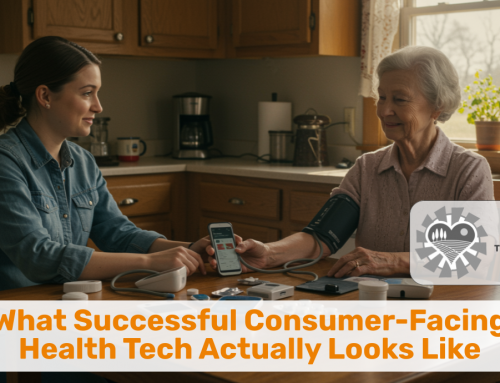In December I surmised that, indeed, telehealth reimbursement is here to stay – simply because it was already pretty good before the Covid-19 health crisis emergency regulations. Granted, the biggest hurdle that was removed — allowing Medicare patients to receive telehealth regardless of their location — was definitely the most important “gift”.
Periodically, well-known telehealth lawyer Nate Lacktman of Foley & Lardner, showers his internet friends with excellent insights into the world of telehealth law and regulations. With today’s article, I’d like to make more people aware of Nate’s frequent updates and provide some commentary on his and his team’s latest posting: “Top 5 Telehealth Law Predictions for 2021”.
1. Medical Licensing for Telehealth
Practicing medicine across state lines has long been an interesting topic, especially for those healthcare providers who draw their patients from across state lines. While it’s perfectly legal for a patient from New Jersey to be seen by a provider in Pennsylvania when said patient shows up in the physician’s office in Philadelphia, it is illegal for that physician to treat the same patient via telemedicine when the patient is at their home in New Jersey (and the physician is only licensed in PA).
The Public Health Emergency (PHE) moved many states to temporarily lift those requirements, but according to the telehealth law team at Foley and Lardner, it is unlikely that a permanent legal solution can be found. Too strong are the traditional state rights, which will not bend to federal regulations.
While I think the scenario I laid out above is of lesser concern, what state medical boards do worry about is that larger, national telehealth services swooping in (in a Walmart-like fashion) to communities, offering “convenient, low-cost access to care”, syphoning off the lucrative well-insured healthy that make many rural health systems’ business model work.
We will thus have to deal with patchwork of medical licensing for years to come, most likely unless any resistance to virtual care services by predominantly brick-and-mortar clinics becomes futile.
2. Telehealth Modalities: Focusing on Outcomes
The second prediction discusses the Covid-19 related lifting of bans on certain telehealth modalities – such as telephone-only visits or requiring an established patient-physician relationship, created through an in-person visit.
As I’ve written about a couple of weeks ago, I’m not a big believer in long-term audio-only telehealth. What’s interesting to see in the lawyers’ predictions is that the trend they are seeing is a push, that I welcome, toward meeting the standard of medical care for a given patient — a push also supported by the American Telemedicine Association (ATA).
In the absence of laws and regulations we here at Ingenium are working with our clients to drive the internal definition of clinical guidelines that based on the consensus of the clinicians define which modalities are appropriate under what circumstances. This move could greatly aid the preparedness for regulatory changes that are focusing on the health outcomes, and less on the technology.
3. Balancing Patient Privacy with Care Coordination
The digital coding of patient health information has long been a double-edged sword: on the one hand, electronification allows for faster processing, for checks and balances and for data sharing between different specialists: the human body is, after all, a complex system of different organs and mechanisms, thus requiring an equally complex system of specialists.
But this easy sharing also opens the door for easier and sometimes accidental violations of privacy (it’s easy to send an Excel spreadsheet that contains protected health information as part of a standard report).
The prediction here is that on the federal level, data sharing may get easier, but similar to the licensing, state privacy laws may limit the ability to share data, even for treatment purposes, easily. I do like the authors’ introduction of the “healthcare consumer” in this context, because all of us are no longer “patients” but consumers of healthcare across a wide spectrum of healthcare entities.
4. Continued Fraud Investigations


At times, as a free-spirited, creative engineer, I tend to find laws and regulations limiting (especially if they are designed to protect special interests that find it hard to go with the modern times). However, the fourth prediction is about the doubling-down of the OIG and DOJ to track down and close down those ventures that are intended to defraud agencies of millions of dollars, e.g., through kickbacks and other schemes.
Those “bad apples” that take advantage of the increased reimbursements, the loosened up regulations, and people’s trust in “health care”, are given the whole industry a truly bad name and I’m happy for this particular prediction.
5. Continued Telehealth Reimbursement
As I predicted in December (Yes, Virginia, there is Telehealth Reimbursement), many Telehealth reimbursement changes in the wake of the PHE will be staying for good. In their New Year prediction list, the Foley & Lardner team are now backing that up with a commentary on the surprising pace with which Medicare reacted.
And it’s not only Medicare, it’s also the commercial payors that continue to follow the direction that CMS has set forth (read on Becker’s how seven payors are expanding their telehealth strategy). A lot of our clients have Medicaid programs and we’ll have to see on a State-by-State basis, how innovative and trendsetting state medicaid programs will be when it comes to paying for telehealth.
Full Steam Ahead into the New Year
While 2020 was by many measures “the year Telehealth became unleashed”, 2021 can be for many “the year Telehealth’s potential was harnessed and realized ”. Many health systems and smaller healthcare providers are now recognizing the strategic and transformative potential that telehealth holds.
Thank you for the Telemedicine and Digital Health team at Foley & Lardner for sharing their insights freely and regularly. I recommend following Nate Lacktman on LinkedIn so as to see his regular postings on his team’s updates.








To receive articles like these in your Inbox every week, you can subscribe to Christian’s Telehealth Tuesday Newsletter.
Christian Milaster and his team optimize Telehealth Services for health systems and physician practices. Christian is the Founder and President of Ingenium Digital Health Advisors where he and his expert consortium partner with healthcare leaders to enable the delivery of extraordinary care.
Contact Christian by phone or text at 657-464-3648, via email, or video chat.









Leave A Comment